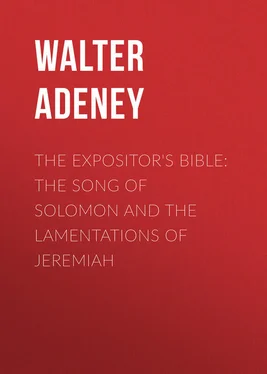Walter Adeney - The Expositor's Bible - The Song of Solomon and the Lamentations of Jeremiah
Здесь есть возможность читать онлайн «Walter Adeney - The Expositor's Bible - The Song of Solomon and the Lamentations of Jeremiah» — ознакомительный отрывок электронной книги совершенно бесплатно, а после прочтения отрывка купить полную версию. В некоторых случаях можно слушать аудио, скачать через торрент в формате fb2 и присутствует краткое содержание. Издательство: Иностранный паблик, Жанр: foreign_religion, foreign_antique, foreign_prose, на английском языке. Описание произведения, (предисловие) а так же отзывы посетителей доступны на портале библиотеки ЛибКат.
- Название:The Expositor's Bible: The Song of Solomon and the Lamentations of Jeremiah
- Автор:
- Издательство:Иностранный паблик
- Жанр:
- Год:неизвестен
- ISBN:нет данных
- Рейтинг книги:3 / 5. Голосов: 1
-
Избранное:Добавить в избранное
- Отзывы:
-
Ваша оценка:
- 60
- 1
- 2
- 3
- 4
- 5
The Expositor's Bible: The Song of Solomon and the Lamentations of Jeremiah: краткое содержание, описание и аннотация
Предлагаем к чтению аннотацию, описание, краткое содержание или предисловие (зависит от того, что написал сам автор книги «The Expositor's Bible: The Song of Solomon and the Lamentations of Jeremiah»). Если вы не нашли необходимую информацию о книге — напишите в комментариях, мы постараемся отыскать её.
The Expositor's Bible: The Song of Solomon and the Lamentations of Jeremiah — читать онлайн ознакомительный отрывок
Ниже представлен текст книги, разбитый по страницам. Система сохранения места последней прочитанной страницы, позволяет с удобством читать онлайн бесплатно книгу «The Expositor's Bible: The Song of Solomon and the Lamentations of Jeremiah», без необходимости каждый раз заново искать на чём Вы остановились. Поставьте закладку, и сможете в любой момент перейти на страницу, на которой закончили чтение.
Интервал:
Закладка:
But we may push the case further. There is a positive improbability of the highest order that the spiritual ideas read into the Song of Solomon by some of its Christian admirers should have been originally there. This would involve the most tremendous anachronism in all literature. The Song of Solomon is dated among the earlier works of the Old Testament. But the religious ideas now associated with it represent what is regarded as the fruit of the most advanced saintliness ever attained in the Christian Church. Here we have a flat contradiction to the growth of revelation manifested throughout the whole course of Scripture history. We might as well ascribe the Sistine Madonna to the fresco-painters of the catacombs; or, what is more to the point, our Lord's discourse with his disciples at the paschal meal to Solomon or some other Jew of his age.
No doubt the devoted follower of the mystical method will not be troubled by considerations such as these. To him the supposed fitness of the poem to convey his religious ideas is the one sufficient proof of an original design that it should serve that end. So long as the question is approached in this way, the absence of clear evidence only delights the prejudiced commentator with the opportunity it affords for the exercise of his ingenuity. To a certain school of readers the very obscurity of a book is its fascination. The less obvious a meaning is, the more eagerly do they set themselves to expound and defend it. We could leave them to what might be considered a very harmless diversion if it were not for other considerations. But we cannot forget that it is just this ingenious way of interpreting the Bible in accordance with preconceived opinions that has encouraged the quotation of the Sacred Volume in favour of absolutely contradictory propositions, an abuse which in its turn has provoked an inevitable reaction leading to contempt for the Bible as an obscure book which speaks with no certain voice.
Still, it may be contended, the analogy between the words of this poem and the spiritual experience of Christians is in itself an indication of intentional connection. Swedenborg has shewn that there are correspondences between the natural and the spiritual, and this truth is illustrated by the metaphorical references to marriage in the Bible which have been adduced for comparison with the Song of Solomon. But their very existence shows that analogies between religious experience and the love story of the Shulammite may be traced out by the reader without any design on the part of the author to present them. If they are natural they are universal, and any love song will serve our purpose. On this principle, if the Song of Solomon admits of mystical adaptation, so do Mrs. Browning's Sonnets from the Portuguese .
We have no alternative, then, but to conclude that the mystical interpretation of this work is based on a delusion. Moreover, it must be added that the delusion is a mischievous one. No doubt to many it has been as meat and drink. They have found in their reading of the Song of Solomon real spiritual refreshment, or they believe they have found it. But there is another side. The poem has been used to minister to a morbid, sentimental type of religion. More than any other influence, the mystical interpretation of this book has imported an effeminate element into the notion of the love of Christ, not one trace of which can be detected in the New Testament. The Catholic legend of the marriage of St. Catherine is somewhat redeemed by the high ascetic tone that pervades it; and yet it indicates a decline from the standpoint of the apostles. Not a few unquestionable revelations of immorality in convents have shed a ghastly light on the abuse of erotic religious fervour. Among Protestants it cannot be said that the most wholesome hymns are those which are composed on the model of the Song of Solomon. In some cases the religious use of this book is perfectly nauseous, indicating nothing less than a disease of religion. When – as sometimes happens – frightful excesses of sensuality follow close on seasons of what has been regarded as the revival of religion, the common explanation of these horrors is that in some mysterious way spiritual emotion lies very near to sensual appetite, so that an excitement of the one tends to rouse the other. A more revolting hypothesis, or one more insulting to religion, cannot be imagined. The truth is, the two regions are separate as the poles. The explanation of the phenomena of their apparent conjunction is to be found in quite another direction. It is that their victims have substituted for religion a sensuous excitement which is as little religious as the elation that follows indulgence in alcoholism. There is no more deadly temptation of the devil than that which hoodwinks deluded fanatics into making this terrible mistake. But it can scarcely be denied that the mystical reading of the Song of Solomon by unspiritual persons, or even by any persons who are not completely fortified against the danger, may tend in this fatal direction.
CHAPTER V
CANONICITY
It is scarcely to be expected that the view of the Song of Solomon expounded in the foregoing pages will meet with acceptance from every reader. A person who has been accustomed to resort to this book in search of the deepest spiritual ideas cannot but regard the denial of their presence with aversion. While, however, it is distressing to be compelled to give pain to a devout soul, it may be necessary. If there is weight in the considerations that have been engaging our attention, we cannot shut our eyes to them simply because they may be disappointing. The mystical interpreter will be shocked at what he takes for irreverence. But, on the other hand, he should be on his guard against falling into this very fault from the opposite side. Reverence for truth is a primary Christian duty. The iconoclast is certain to be charged with irreverence by the devotee of the popular idol which he feels it his duty to destroy; and yet, if his action is inspired by loyalty to truth, reverence for what he deems highest and best may be its mainspring.
If the Song of Solomon were not one of the books of the Bible, questions such as these would never arise. It is its place in the sacred canon that induces people to resent the consequences of the application of criticism to it. It is simply owing to its being a part of the Bible that it has come to be treated mystically at all. Undoubtedly this is why it was allegorised by the Jews. But, then, the secondary signification thus acquired reacted upon it, and served as a sort of buoy to float it over the rocks of awkward questions. The result was that in the end the book attained to an exceptionally high position in the estimation of the rabbis. Thus the great Rabbi Akiba says: "The course of the ages cannot vie with the day on which the Song of Songs was given to Israel. All the Kethubim ( i. e. , the Hagiographa ) are holy, but the Song of Songs is a holy of holies."
Such being the case, it is manifest that the rejection of the mystical signification of its contents must revive the question of the canonicity of the book. We have not, however, to deal with the problem of its original insertion in the canon. We find it there. Some doubts as to its right to the place it holds seem to have been raised among the Jews during the first century of the Christian era; but these doubts were effectually borne down. As far as we know, the Song of Solomon has always been a portion of the Hebrew Scriptures from the obscure time when the collection of those Scriptures was completed. It stands as the first of the five Megilloth , or sacred rolls – the others being Ruth, Lamentations, Esther, and Ecclesiastes. We are not now engaged in the difficult task of constructing a new canon. The only possibility is that of the expulsion of a book already in the old canon. But the attempt to disturb in any way such a volume as the Old Testament, with all its incomparable associations, is not one to be undertaken lightly or without adequate reason.
Читать дальшеИнтервал:
Закладка:
Похожие книги на «The Expositor's Bible: The Song of Solomon and the Lamentations of Jeremiah»
Представляем Вашему вниманию похожие книги на «The Expositor's Bible: The Song of Solomon and the Lamentations of Jeremiah» списком для выбора. Мы отобрали схожую по названию и смыслу литературу в надежде предоставить читателям больше вариантов отыскать новые, интересные, ещё непрочитанные произведения.
Обсуждение, отзывы о книге «The Expositor's Bible: The Song of Solomon and the Lamentations of Jeremiah» и просто собственные мнения читателей. Оставьте ваши комментарии, напишите, что Вы думаете о произведении, его смысле или главных героях. Укажите что конкретно понравилось, а что нет, и почему Вы так считаете.












